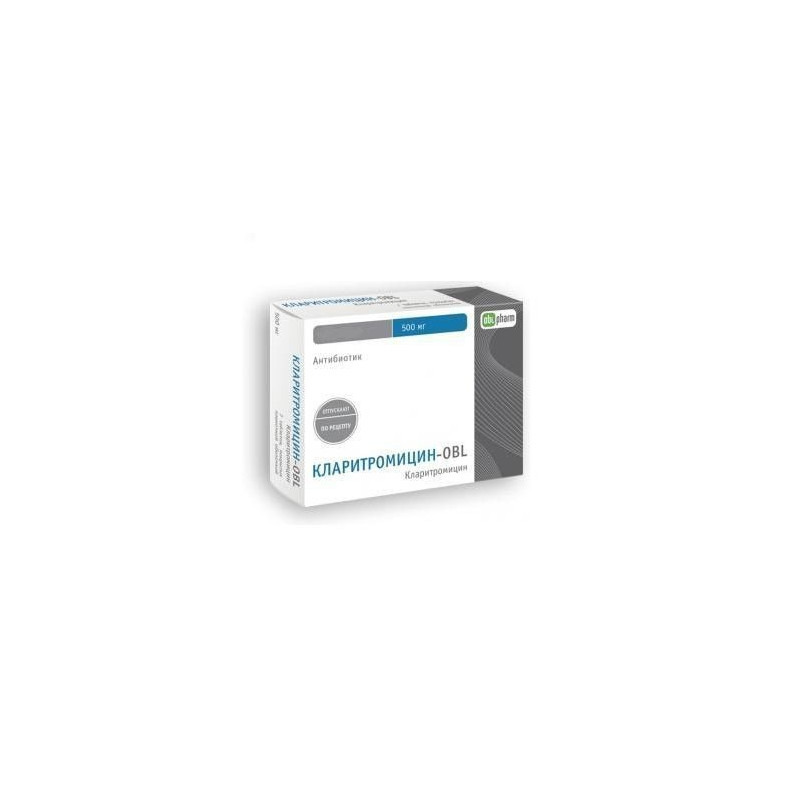



 All payments are encrypted via SSL
All payments are encrypted via SSL
 Full Refund if you haven't received your order
Full Refund if you haven't received your order
Film Coated Tablets
1 pill contains 500 mg clarithromycin
7 pieces
Clarithromycin, a macrolide antibiotic, suppresses protein synthesis in a microbial cell by interacting with the 50S ribosomal subunit of bacteria. Active in the area of the day pertussis, Propionibacterium acnes, Mycobacterium avium, Mycobacterium leprae, Staphylococcus aureus, Ureaplasma urealyticum, Toxoplasma gondii. When ingested, clarithromycin is metabolized to form the main metabolite 14hydroxylarithromycin, which has the same or 1-2 times less (depending on the type of microorganism) antimicrobial activity than the unchanged substance.
Infections caused by microorganisms sensitive to clarithromycin - infections of the upper respiratory tract (laryngitis, pharyngitis, tonsillitis and sinusitis); lower respiratory tract infections (bronchitis, bacterial pneumonia); infections of the skin and soft tissues (folliculitis, furunculosis, impetigo, wound infection); infections caused by Mycobacterium avium, Chlamydia trachomatis, Helicobacter pylori, Ureaplasma urealyticum.
The dosage regimen and the duration of the course of treatment are determined individually, taking into account the indications, the severity of the infection, the sensitivity of the pathogen.
For adults and children over 12 years oldthe average dose is 250 mg 2 times a day. If necessary, clarithromycin can be administered 500 mg 2 times a day. Duration of treatment is 5-14 days.
In the treatment of infections caused byMycobacterium avium, sinusitis, severe infections, including caused byHaemophilus influenzae, - 500–1000 mg twice a day; the maximum daily dose of 2 g. For children up to 12 years old - at the rate of 7.5 mg / kg body weight every 12 hours; maximum daily dose of 500 mg. In patients with renal insufficiency (with Cl creatinine less than 30 ml / min or serum creatinine concentration more than 3.3 mg / 100 ml), the dose should be reduced by 2 times.The maximum duration of treatment in patients of this group is no more than 14 days.
From the gastrointestinal tract:
Nausea, vomiting, dyspepsia, diarrhea, abdominal pain, stomatitis, glossitis, pancreatitis, oral candidiasis, discoloration of the tongue and teeth; rarely pseudomembranous enterocolitis. Tooth discoloration is reversible and is usually restored with a special treatment in a dental clinic. As with the admission of other antibiotics from the group of macrolides, liver dysfunction is possible, including increased liver enzyme activity, hepatic cell and / or cholestatic hepatitis with or without jaundice. These abnormal liver functions can be severe, but usually they are reversible. Very rarely, there have been cases of liver failure and death mainly due to severe concomitant diseases and / or concomitant drug therapy.
From the blood system:
In exceptional cases, leukopenia and thrombocytopenia; increased serum creatinine level.From the central and peripheral nervous system:
Paresthesia, headache, olfactory disorders, changes in taste; dizziness, agitation, insomnia, nightmares, fear, ringing in the ears, confusion, disorientation, hallucinations, psychosis, depersonalization; reversible hearing loss; convulsions.
Cardiovascular:
As with other macrolides, prolongation of the QT interval, ventricular tachycardia. Polymorphic ventricular tachyarrhythmia (torsades de pointes).
Musculoskeletal system:
Arthralgia, myalgia
Urogenital:
Individual cases of increased plasma creatinine, interstitial nephritis, renal failure
Allergic reactions:
Urticaria, angioedema, anaphylactic shock, in rare cases - Stevene-Johnson syndrome, toxic epidermal necrolysis.
With simultaneous appointment of clarithromycin with theophylline and Carbamazepine, an increase in the plasma content of the latter was noted.
Symptoms: gastrointestinal symptoms; In one of the patients taking 8 g of clarithromycin, there was a case of mental disorder, paranoid behavior, hypoglycemia, hypoxemia.
Treatment: gastric lavage, maintenance therapy. Hemodialysis or peritoneal dialysis is ineffective, as for other macrolides.
Store in a dry, dark place inaccessible to children at a temperature up to 25 ° C.
2 years.
Clarithromycin